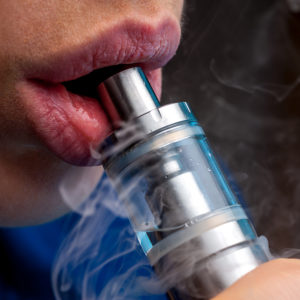As the coronavirus pandemic drags on, we’re all concerned for our health. But the latest efforts to crack down on vaping in Massachusetts aren’t delivering the public health benefits their supporters promised — and it’s not hard to see why.
While Massachusetts imposes a whopping 75 percent excise tax on the wholesale price of all vaping equipment and prohibits the sale of flavored products, many of its neighbors have taken a different approach. New York, for example, levies a 20 percent tax on e-cigarettes, while Connecticut has adopted a 10 percent tax and Rhode Island has none at all. So while e-cigarette sales have declined in Massachusetts, the state’s draconian policies have led to a sharp rise in cross-border shopping by users seeking lower prices and freer access to the products they like. The effect on overall consumption: negligible at best.
But it gets worse. By compelling consumers to visit border states to buy the products they want, these policies divert economic activity away from Massachusetts, depriving businesses and workers of opportunities.
Lawmakers in the Bay State and elsewhere should heed the experiences of other jurisdictions that have tried to legislate health behavior. In 2011, for example, Denmark implemented a tax on saturated fats in an effort to promote more balanced diets. The measure was repealed just 15 months later after cross-border shopping from Denmark to neighboring countries surged, causing the loss of an estimated 1,300 Danish jobs and no meaningful change in saturated fat consumption. When Philadelphia implemented a tax on sugary beverages in 2017, the same thing happened: sales dropped in Philadelphia and rose in surrounding areas, costing the city 1,200 jobs and nearly $80 million in economic output.
Like other states where restrictions have been implemented, Massachusetts isn’t just making a strategic mistake. The goal of discouraging e-cigarette use through broad, indiscriminate policies is fundamentally at odds with the best scientific evidence on harm reduction and public health.
When researchers examined the effects of Massachusetts’ flavor ban and tax, they found that messaging by health authorities questioning the safety of e-cigarettes led to an increase in combustible cigarette use in the Boston area.
It is now well-established that e-cigarettes are vastly less toxic than regular, combustible cigarettes. In 2015, Public Health England conducted a review of the scientific literature and found that “e-cigarettes are 95 percent less harmful to your health than normal cigarettes, and when supported by a smoking cessation service, help most smokers to quit tobacco altogether.”
Indeed, studies have estimated that e-cigarettes are nearly twice as effective as smoking cessation aids as FDA-approved products such as gum and nicotine patches. That helps explain why the uptick in vaping in recent years has been accompanied by plunging smoking rates.
By targeting e-cigarettes, Massachusetts risks driving former smokers back to the pack, and reducing the likelihood that current smokers will abandon the habit. This danger is exacerbated by the fact that the excise tax rates Massachusetts imposes on cigarettes, cigars and smoking tobacco are substantially lower than the rates that apply to vaping products.
A study in Minnesota, which has a similarly high tax rate as Massachusetts, at 95 percent, found that if the tax had been removed, about 32,400 additional smokers would have quit. Another study came to similar conclusions: raising taxes on e-cigarettes reduced their consumption among teens, but increased sales of combustible cigarettes. “We conclude that the unintended effects of (e-cigarette) taxation may considerably undercut or even outweigh any public health gains,” the researchers warned.
Moreover, concerns over the “epidemic” of youth vaping often ignore important facts. Among teens who vape often, nearly all are or were smokers; for them, e-cigarettes offer a far healthier alternative to combustible cigarettes. According to the 2015 National Youth Tobacco Survey, just 0.3 percent of non-smoking teenagers regularly vaped.
This is a matter of life and death for the 13.4 percent of adults and 5 percent of teens in Massachusetts who currently smoke. Because 9,300 die each year of tobacco-related illnesses.
Policies should be judged on their efficacy, not good intentions. The residents of Massachusetts and elsewhere deserve better than these misguided policies.

